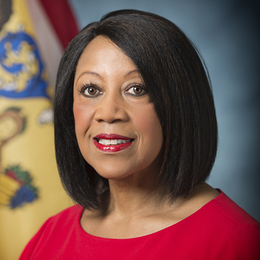
Leading by Example
Although Lt. Gov. Sheila Oliver is viewed as a trailblazer by many, her main motivation is to help improve the lives of everyday New Jerseyans.
As the first woman of color to ever serve in statewide elected office in New Jersey, Lt. Gov. Sheila Oliver just may be setting an example for younger generations the way people like Shirley Chisholm and Thurgood Marshall once did for her.
But her place in history is not something Oliver often thinks about. She has considered herself a community activist since her days at Weequahic High School in Newark during the “turbulent 1960s,” and sees her current role as an extension of that mindset.
“I don’t [look at myself as a trailblazer], but I do know the significance of [being lieutenant governor] and I know how important it is to people,” she says. “Everywhere I go, people tell me how proud they are and they tell me they finally have a voice in the political system at a high level. I do respect that and I do try to represent and reflect the interests of everyday, normal people.”
Perhaps it is not surprising, then, that Oliver’s proudest moments in her nearly two years as Gov. Phil Murphy’s second-in-command revolve around the working class. She cites the raising of the minimum wage, the passing of one of the country’s toughest wage-theft bills and the restoration of the Affordable Housing Trust Fund as the administration’s most notable accomplishments to date.
We spoke to Oliver—who was previously speaker of the General Assembly, the first African-American woman in state history and second in the country to serve in that capacity—about her distinguished career, those who inspired her and how she relaxes during her rare downtime.
Who or what first inspired you to go into politics?
I was always a community activist, starting back in high school. I went to high school in the ’60s and there was so much social change happening across the country. I got involved with student groups in Newark during that time, and when I went to undergraduate school, I went to a very socially conscious school—Lincoln University in Pennsylvania, which is the oldest HBCU in the country. They graduated people like Thurgood Marshall and Langston Hughes, so many people who were firsts in their field. … That’s the environment I got exposed to, so from a historical context I always paid attention to history. … I was [also] inspired by the first black congresswoman, Shirley Chisholm, who ran for president, and Bella Abzug, who was a congresswoman from New York who was very assertive. Those women really influenced me.
I never aspired to run for office; I never aspired to be an elected official. But I was an activist and people who were running for office began to approach me about running on tickets to help them win, and I did that. I did that to help Sen. [Richard] Codey back in the day and then the Essex County chairman, Leroy Jones, was running for mayor of East Orange and then state senate. When he ran for state senate, I ran as an assembly candidate with him to support his ticket. He didn’t win that election, but I won my election and that’s how I got into the General Assembly.
You were born and raised in New Jersey. Is that an advantage in your role?
Being a native of New Jersey, I’ve had a lifetime of being able to know all of the communities and the counties and the civic organizations and the leaders in different towns. Then when I was the speaker, I made a commitment to visit all 40 legislative districts, so I could balance out the regional interests that exist in this state. I think being a lifelong native of New Jersey, I understand the culture of our state. Sometimes people say … New Jersey has a lot of New Jersey attitude. I do think that people can be offensive, but that’s just part of our culture here. I understand that and it helps me work with all people, because I know culturally who we are.
Even though you’re originally from Newark and have lived in East Orange for many years, do you feel like you have a good connection with South Jersey as well?
I’ve formed very good relationships with officials in South Jersey … so I’m no stranger to the communities of the South and the leaders. There’s often been the proverbial regional combat that we have, but that’s not helpful. … Personally, I know people from the South, I get along with them and I worked with them over the 16-year period I was in the Legislature. I look at everybody as an individual trying to represent a constituency. Does Camden have a lot of challenges? Yes, but I think we have to reach a consensus on the best way to move Camden out of this position they always find themselves in, being the poorest or second-poorest city. If you turn the clock back 25 years ago and you traveled throughout Camden County, you can see a lot of development [since then]. Places like Voorhees and Winslow and a lot of other towns are seeing increases in housing development. I encourage people, especially decision-makers and policy-makers, to travel around the state and get a feel for these places. Often we only pay attention to the eight big cities in New Jersey, but it can’t just be about them. There’s poverty in every county in New Jersey. There are homeless people and people who are unemployed.
What are your primary goals for the rest of your tenure as Lt. Gov.?
I think going forward we’re going to have to work with the Legislature to get our fiscal house in order. I know that conversations are being had with the various stakeholders, the office of the governor and the Legislature and its leadership to seriously focus on how we have to lower the cost of our public worker benefits and the cost of our health care systems, and how we have to figure out how to give tax relief to people in communities. I hear from people all the time, especially older adults whose mortgages may be paid for, that they are still faced with high property taxes and high cost of living. If we don’t figure something out, we’re not going to be able to stop retirees from moving to Florida, where there’s no income tax, or moving to Delaware or the Carolinas. I know people who have moved from Trenton to South Carolina, because after the age of 65 you don’t pay property taxes in South Carolina. I’m very proud and pleased with our socially progressive agenda, but I also know that we have to give focus to the economic conditions in our state. The governor is working hard to expand the economy, attract new businesses to the state and create higher-wage jobs for people in New Jersey.
We are starting to see a little more diversity in our leadership across the country. Are you hopeful about the way things are headed?
I think women—not of my generation, but this new generation of women—they don’t ask permission. They don’t wait around for someone to ask them to participate. I think this generation of professional women and activist women have learned the ropes. We have organizations like Emerge, which is a boot camp to get women prepared to run [for office]. Down at Eagleton, we have [a training program called] Ready to Run, and we also have the Women’s Political Caucus. Women are understanding that they have the ability to raise money and they have the ability to organize support.
Is there anyone you admired from afar who you were able to meet in your public life?
My all-time favorite was the opportunity on more than one occasion to meet Barack Obama, followed by the opportunity to meet Michelle Obama. In January, Speaker [Nancy] Pelosi invited Sen. [Loretta] Weinberg and I to be her special guests for the State of the Union address by the president, and that was very exciting. After the address, we returned to the speaker’s office, where she invited several of us to participate in a roundtable. That was very exciting to me as well.
How do you like to unwind and enjoy some time to yourself?
I love to travel and my favorite travel destinations are Caribbean places—anyplace there’s sand and palm trees.
To read the digital edition of South Jersey Magazine, click here.
Published (and copyrighted) in South Jersey Magazine, Volume 16, Issue 9 (December 2019).
For more info on South Jersey Magazine, click here.
To subscribe to South Jersey Magazine, click here.
To advertise in South Jersey Magazine, click here.
To read the digital edition of South Jersey Magazine, click here.
Published (and copyrighted) in South Jersey Magazine, Volume 16, Issue 9 (December 2019).
For more info on South Jersey Magazine, click here.
To subscribe to South Jersey Magazine, click here.
To advertise in South Jersey Magazine, click here.











